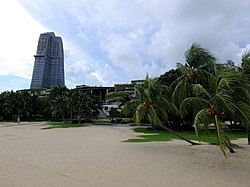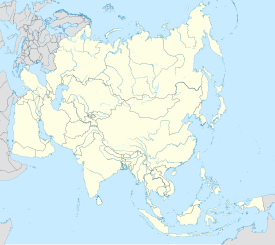Forest City (Johor)
Forest City | |
|---|---|
| Forest City | |
 | |
 Flag  Emblem | |
 Forest City | |
| Coordinates: 01°20′10″N 103°35′29″E / 1.33611°N 103.59139°ECoordinates: 01°20′10″N 103°35′29″E / 1.33611°N 103.59139°E | |
| Country | |
| State | |
| District | Johor Bahru |
| Government | |
| • Body | Iskandar Puteri City Council |
| Time zone | UTC+8 (MST) |
| • Summer (DST) | UTC+8 (Not observed) |
| Postal code | 80xxx to 81xxx |
| Area code(s) | 07 |
| Vehicle registration | J |
| Website | www |


Forest City Johor is an integrated residential development located on the slopes of Gelang Patah, Johor Bahru District, Johor, Malaysia on 1,370 hectares. Announced in 2006 as a twenty-year project, the project was pitched under China's Belt and Road Initiative.[1] It was opened by Prime Minister of Malaysia Najib Razak and approved by the Sultan of Johor, Sultan Ibrahim Ismail.[2] Forest City in Johor is in partnership with Esplanade Danga 88, an affiliate of the Johor People's Infrastructure Group (KPRJ), through a joint venture, Country Garden Holding Ltd (CGPV), with CGPV holding 60 percent of shares, while KPRJ holds the other 40 percent.[3]
Forest City is under the management of the Iskandar Puteri City Council and the Iskandar Regional Development Authority.
Criticism and controversy[]
Environmental impact[]
Despite being marketed as "an energy-efficient, ecologically sensitive, land-conserving, low-polluting offshore city", the development has had significant negative environmental impact, with irreversible damage due to reclamation of ecologically sensitive coastal wetlands.[4][5]
The area within which Forest City lies is protected as an Environmentally Sensitive Area (ESA) Rank 1 area, where no development is allowed except for low-impact nature tourism, research and education.[6] Chief to this designation are two areas of international ecological significance, the Tanjung Kupang intertidal seagrass meadow, the largest of its kind in Malaysia, and the Pulai River Mangrove Forest Reserve, designated as a wetland of international importance under the Ramsar Convention.
Reclamation began in January 2014 without the legally required Detailed Environmental Impact Assessment (DEIA).[7][8] Residents from Kampung Tanjung Kupang, a traditional fishing village, complained of reduced catches and other issues to the local and Johor State authorities to no avail.[5][9][10]
Malaysia had also not informed Singapore as required under their 2005 International Tribunal for the Law of the Sea-mediated agreement on reclamation works and other treaties.[5][11][12] Singapore subsequently sent a diplomatic note in May 2014 to the Malaysian Federal government requesting clarification on issues including: potential changes in water current speeds and the subsequent impact on navigational safety; possible erosion that might affect shoreline and Second Link infrastructure; and changes in water quality and morphology that might affect the coastal and marine environment and local fish farms. Following this and an accompanying outcry by international environmental watchdogs, the Environment Ministry sent a request for the DEIA to City Gardens on 6 June 2014, and issued a stop-work order on 17 June 2014, although it was reported that work continued despite the stop-work order.[6]
The DEIA was issued in January 2015, confirming that the regulations had been side-stepped and contained 81 directives, including a reduction in size from 1,600 hectares to less than 405 hectares. It acknowledged that the seagrass ecosystem had been split into two and "will be heavily impacted by the proposed development" despite these measures.[5][6][13][14] Country Garden subsequently announced that it was downsizing the project by a third and dividing it into four islands, although there was subsequent evidence that some of these measures were not implemented, including photographs where silt curtains were absent and of buffer zones that were less than 100m (as opposed to the agreed 300m).[7] Concerns also remained about the permanent impact on the seagrass, water hydrology, and loss of traditional fishing grounds, which these measures will not fully alleviate.[6]
Other environmental concerns include claims that sand from local hills was being used at the project site and fears of stress on local water sources and sewage discharge.[6]
Safety considerations[]
Cracks began to appear in the Show Gallery, hotel buildings and roads soon after construction. There were claims that the speed of the land reclamation did not allow time for the soil to settle and stabilize, with a building consultant opining that the land was sinking, and would likely continue to do so.[6]
Malaysian politics[]
There were multiple allegations of corruption at various levels and multiple stages of the project.[4][6][8]
While Country Garden employed some locals, most of Forest City's workforce comprised low-wage labourers from South Asia or white-collar workers from China.[4]
In 2018, Mahathir Mohamed, campaigning on a platform which included criticism of Chinese investment and corruption, defeated the incumbent Malaysian Prime Minister Najib Razak who had originally approved the project, and issued a "ban" on foreigners buying property.[15] This was subsequently re-structured as changes to the long term visa program in order to mitigate objections and potential legal challenges raised by the developer.[16][17]
International politics[]
The project was targeted at upper-middle-class Chinese citizens looking to park wealth abroad, offering relatively affordable seafront properties compared to expensive coastal city like Shanghai.[4][13] However, initial strong sales from mainland China collapsed after Chinese leader Xi Jinping implemented currency controls, including a $50,000 annual cap on how much buyers could spend outside the country.[13][18]
Progress[]
The project was described by Foreign Policy as a "massive boondoggle".[4] By the end of 2019, only 15,000 units had been sold,[19] compared to a target of 700,000,[20] and as few as 500 people actually lived in the development.[4]
Following the 2018 change in Malaysian government and subsequent political uncertainty, the worsening geopolitical environment between Malaysia and China, and suspension of the Malaysia My Second Home long term visa scheme, some Chinese nationals (who formed the majority of buyers) decided to leave the development and sold their units at steep losses, further adding to the supply overhang.[21][22]
In 2020, the COVID-19 pandemic led to increasing economic uncertainty and travel restrictions, severely affecting sales which dropped by more than 90% after March 2020.[19] Following implementation of Malaysia's Movement Control Order, some residents returned to their home countries. COVID-19 restrictions on travel between Malaysia and Singapore presented difficulties for the remaining residents, especially those working in or with children schooling in Singapore. Some tenants also suspended operations or pulled out, citing restrictions due to the Movement Control Order or commercial non-viability.[21][23]
Location[]
Forest City is located in Tanjung Kupang Village next to Tanjung Pelepas Port, within the Iskandar Malaysia Special Economic Zone (SEZ) in southern Johor. The City comprises four human-made islands.
Forest City was originally a mangrove swamp populated by locals who worked as farmers and fishers in Kampung Tanjung Kupang.
Types of access[]
- Malaysia–Singapore Second Link
- Broken Skudai-Brick Road
- Tanjung Pelepas Highway
See also[]
- Land reclamation
- Habitat destruction
- Iskandar Malaysia
- Johor Bahru
- Belt and Road Initiative
- Malaysian National Projects
References[]
- ^ Bloomberg News (23 June 2017). "The $100 Billion City Next to Singapore Has a Big China Problem". Bloomberg. Retrieved 2020-06-12.
- ^ "Malaysia's Forest City to hand over more than 20,000 residential units this year as it unveils new golf course". South China Morning Post. 9 Sep 2019.
- ^ "Forest City, Country Garden Pacificview". 13 April 2017.
- ^ a b c d e f Saha, Sagatom (21 November 2019). "Chinese Companies Are Worse at Business Than You Think". Foreign Policy.
- ^ a b c d Adis, Khalil. "Study: Forest City project has done more harm than good". www.khaliladis.com.
- ^ a b c d e f g Rahman, Serina (2017). "Johor's Forest City Faces Critical Challenge". Trends in Southeast Asia Series : Wto Issues. Yusof Ishak Institute. ISSN 0219-3213.
- ^ a b Schneider, Keith (6 September 2018). "A civic outcry in Malaysia forces a Chinese builder to live up to its eco-friendly promise". Eco-Business.
- ^ a b Williams, Joseph (2016). "Evaluating Megaprojects: The Case Of Forest City In Johor, Malaysia" (PDF). Malaysia Sustainable Cities Program. Massachusetts Institute of Technology.
- ^ Ourbis, Sylvain (30 Aug 2017). "Malaysia's Forest City and the Damage Done". thediplomat.com.
- ^ Aw, Nigel (14 July 2014). "The case of Forest City and the Johor sultan". Malaysiakini.
- ^ Ritikos, Jane (25 Apr 2005). "Malaysia and Singapore to sign agreement on reclamation work | The Star". www.thestar.com.my. The Star.
- ^ Cheong, Koon Hean (2013). Malaysia & Singapore : the land reclamation case : from dispute to settlement. Singapore. ISBN 9789814342513.
- ^ a b c Schneider, Keith (2 July 2019). "As opposition wanes, a Malaysian land reclamation project pushes ahead". Mongabay Environmental News.
- ^ Lee, Marissa (15 January 2015). "Forest City environmental impact report: A closer look at what M'sia approved". The Straits Times.
- ^ Iwamoto, Kentaro (28 August 2018). "Mahathir foreign-ownership ban rattles $100bn China-led project". Nikkei Asia.
- ^ "Foreigners can buy Forest City units, but will not be issued residential visas: Mahathir". The Straits Times. 2018-09-05. Retrieved 2020-06-12.
- ^ "Malaysia says committee to study Forest City project". Reuters. 2018-08-28. Retrieved 2020-06-12.
- ^ Ryan, Ong (14 April 2017). "The Forest City debacle: 4 lessons to learn buying overseas property". 99.co.
- ^ a b https://asia.nikkei.com/Business/Markets/Property/Coronavirus-slows-China-funded-100bn-city-in-Malaysia
- ^ Saha, Sagatom. "Chinese Companies Are Worse at Business Than You Think". Foreign Policy. Retrieved 2020-06-12.
- ^ a b "China's middle-class dream of a second home in Malaysia dashed by coronavirus and geopolitical tensions | The Star". www.thestar.com.my.
- ^ "Coronavirus and geopolitical tensions dash Chinese dreams in Malaysia". South China Morning Post. 20 September 2020.
- ^ Maloberti, Gregg (16 April 2020). "Covid-19 Update". Shattuck-St. Mary’s Forest City International School. Retrieved 28 February 2021.
External links[]
| Wikimedia Commons has media related to Forest City. |
- Forest City (Johor) - Official Site
- Forest City Malaysia - Resource page with project information and archive of news updates.
- Iskandar Puteri
- Populated coastal places in Malaysia
- Populated places in Johor
- Belt and Road Initiative


